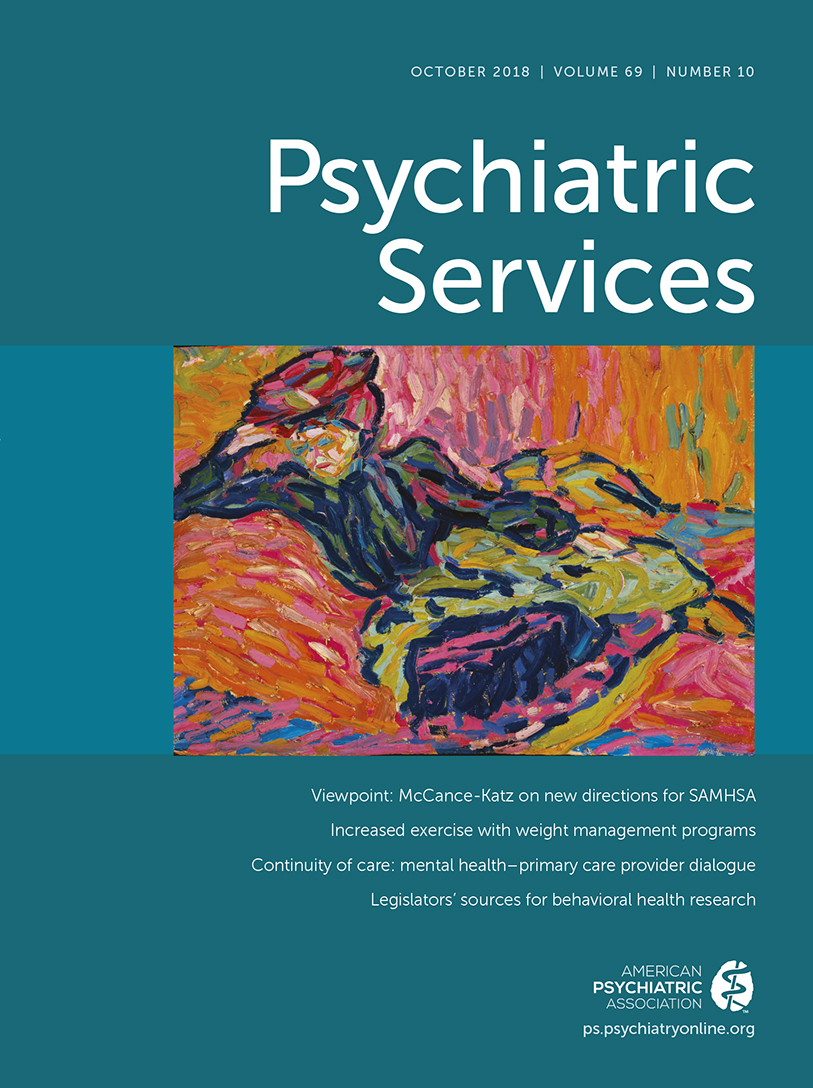Health Screening and Follow-up Care Among Medicaid Beneficiaries With Serious Mental Illness Enrolled in Managed Care Plans
TO THE EDITOR: Studies have consistently documented high rates of obesity and tobacco use among individuals with serious mental illness (1). In recent years, Medicaid programs have enrolled individuals with serious mental illness into managed care plans (2), which are responsible for ensuring that their members receive preventive care. Despite the movement to managed care, not much is known about whether this population receives routine screening and follow-up care for common comorbid health conditions and health behaviors.
As part of a project that developed quality measures for health plans (3), we pilot-tested measures that assessed the proportion of health plan members with serious mental illness (schizophrenia, bipolar disorder, or major depression) who received screening and follow-up care (when indicated) for obesity and tobacco use during calendar year 2012. Following procedures used for reporting HEDIS measures, health plans in three states used their claims and administrative data to identify a random sample of members with serious mental illness and then reviewed all available medical records (primary care and behavioral health clinic records) and claims and administrative data for these members to look for evidence of screening and follow-up care.
Screening and follow-up rates varied widely across plans. Overall, 54% of 855 individuals with serious mental illness had their body mass index (BMI) documented during the year (N=464, range 19%–80%) (online supplement). Among those with a BMI ≥30, 38% (N=86) received counseling, medications, or other follow-up care for unhealthy weight (range 14%–43%). Forty-seven percent of 756 were screened for tobacco use (N=356, range 15%–76%). Among tobacco users, 57% (N=113) received counseling, medications, or other follow-up care for tobacco use (range 48%–66%). We then calculated an overall rate for each health plan to assess the proportion of members with serious mental illness who were screened and received follow-up care if the screening results were positive. This yielded an average performance rate of 38% (N=323) for obesity (range 12%–55%) and 36% (N=269) for tobacco use (range 10% to 64%).
These rates of screening and follow-up care were lower than those for other populations. During the same year, accountable care organizations that reported similar measures for the Physician Quality Reporting System reported that 54% of their members received screening and follow-up care (when indicated) for BMI and that 81% received screening and follow-up care (when indicated) for tobacco use (4). Although average screening and follow-up rates were low across the three health plans, the range across plans was wide, suggesting that some plans have room for improvement and others may have performed well. This variation could be driven by many factors, including geographic differences in the availability of services and different processes that health plans use to monitor and coordinate care. Performance on these measures can provide health plans and Medicaid programs with information to further investigate the sources of variation in screening and follow-up rates. We report these findings to encourage quality improvement efforts and provide a benchmark by which to measure progress. The National Quality Forum endorsed the measures piloted in this study, and they are available for states and health plans to implement (5).
1 : Cigarette smoking and overweight/obesity among individuals with serious mental illnesses: a preventive perspective. Harvard Review of Psychiatry 14:212–222, 2006Crossref, Medline, Google Scholar
2 : Medicaid Moving Ahead in Uncertain Times: Results From a 50-State Medicaid Budget Survey for State Fiscal Years 2017 and 2018. Menlo Park, CA,
3 : Development and Testing of Behavioral Health Quality Measures for Health Plans. Washington, DC, Mathematica Policy Research, March 2015. https://aspe.hhs.gov/basic-report/development-and-testing-behavioral-health-quality-measures-health-plans-final-reportGoogle Scholar
4 2012 Reporting Experience Including Trends (2007–2013). Physician Quality Reporting System and Electronic Prescribing (eRx) Incentive Program. Baltimore, Centers for Medicare and Medicaid Services, March 14, 2014Google Scholar
5 Measure 2601, Body Mass Index Screening and Follow-up for People With Serious Mental Illness, and measure 2600, Tobacco Use Screening and Follow-up for People With Serious Mental Illness or Alcohol or Other Drug Dependence. Washington, DC, National Quality Forum. https://www.qualityforum.org/home.aspxGoogle Scholar



